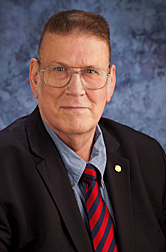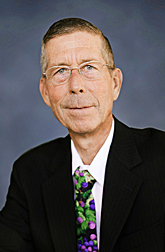This page has been archived and is being provided for reference purposes only. The page is no longer being updated, and therefore, links on the page may be invalid.
|
|
|
|
Three Scientists Named to ARS Science Hall of Fame
By Dennis O'BrienSeptember 11, 2013
WASHINGTON—Three scientists have earned places in the Agricultural Research Service (ARS) Science Hall of Fame for discoveries that have improved the environment, deepened the understanding of plant biology, and improved the quality of grapes and other fruits. ARS is the chief intramural scientific research agency of the U.S. Department of Agriculture (USDA).
Rufus L. Chaney, Sarah Hake and David W. Ramming will be honored tonight in a ceremony at the U.S. National Arboretum here. ARS established its Science Hall of Fame in 1986 to recognize agency researchers for outstanding, lifelong achievements in agricultural sciences and technology. Nominees must be retired or eligible to retire to receive the award.
"The results of research conducted by this year's Hall of Fame honorees will not only help the agricultural community, but the nation as a whole," said Caird Rexroad, acting administrator of ARS. "They have contributed to the safety and quality of our food supply, shed light on the genetics of plant growth with far reaching implications for future crop production, and ensured the continued success of a grape and stone fruit industry vital to our economy."
Chaney, an agronomist in the ARS Environmental Management and Byproduct Utilization Laboratory in Beltsville, Md., is an international expert on assessing the health and environmental risks posed by trace metals in contaminated soils, manures, biosolids, composts and other soil amendments.
Chaney's work has been critical to ensuring the safety and sustainability of a variety of crop production systems. He also has found innovative ways to revegetate and revitalize long-barren toxic waste sites, including Superfund sites, using composts, limestone and byproducts to minimize the environmental risks from soil metals.
Hake, who is director of the ARS Plant Gene Expression Center in Albany, Calif., was the first scientist to clone a developmental gene using a transposable or "jumping" gene, and the first to identify a class of genes in plants that activate a cascade of other genes. The discovery of these influential genes that determine the architecture of plants was a surprise that created a whole new subfield of plant genomic studies.
In other work focused on plant mechanisms, Hake showed that protein from the specialized genes moves through holes in cell walls to influence the activity of adjacent cells, an achievement considered groundbreaking and cited thousands of times by other scientists. Her work in leaf architecture and flower spike development in maize also has placed her at the forefront of plant biology.
Ramming, who retired in January from the ARS San Joaquin Valley Agricultural Sciences Center at Parlier, Calif., is responsible for developing 40 varieties of table grapes, raisin grapes, peaches, apricots and other stone fruits, and has been instrumental in developing technologies that address a number of grower concerns. His 15 varieties of table grapes represent more than half of the table grape production in California.
He also led research that resulted in a plant regeneration system that allows for the routine insertion of genes into grapes, speeding up the process for developing improved varieties. Embryo rescue techniques developed by Ramming also have significantly shortened the time required for development of new table grape and raisin grape cultivars.
ARS scientists conduct research to help provide solutions to agricultural issues that affect the lives of Americans each day. They work to ensure high-quality, safe food and other agricultural products; improve nutrition and health of children; enhance development of new bioenergy sources; and support agricultural sustainability and rural wealth creation.



